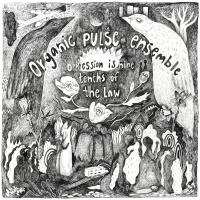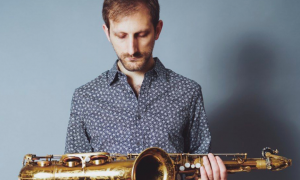Home » Jazz Articles » Interview » Mark Feldman: His Own Music, His Own Sound, His Own Aesthetic
Mark Feldman: His Own Music, His Own Sound, His Own Aesthetic
I used to be a fiddle player who played through a guitar amp. I used to try to copy saxophone licks. I used to use no vibrato. I used to do that kind of jazz-violin thing. But you know, I am of European descent. I am a violinist. I think the legacy of the violin is part of my picture.
 In his twenty years in New York City, violinist Mark Feldman's played a dizzying number of gigs and sessions with trumpeter Dave Douglas, pianist Uri Caine, saxophonist Tim Berne, drummer Billy Hart, pianist Muhal Richard Abrams, bassist Mark Dresser, and of course, saxophonist John Zorn, with whom Feldman has had a particularly fruitful association.
In his twenty years in New York City, violinist Mark Feldman's played a dizzying number of gigs and sessions with trumpeter Dave Douglas, pianist Uri Caine, saxophonist Tim Berne, drummer Billy Hart, pianist Muhal Richard Abrams, bassist Mark Dresser, and of course, saxophonist John Zorn, with whom Feldman has had a particularly fruitful association.
He was a founding member of the seminal ensembles Arcado String Trio and New & Used, collaborates regularly with his wife, pianist/composer Sylvie Courvoisier (interpreting Zorn material and doing their own compositions) and is a current member of guitarist John Abercrombie's band. This Downtown-improv scene ubiquity (which has coexisted with Feldman's session work with pop artists like Sheryl Crow and Diana Ross) can be seen as the third geography-based period of Feldman's career as a musician. The first was in Chicago, his hometown, where he played in the Civic Orchestra while simultaneously doing bar gigs playing rockabilly and western swing and studying jazz improvisation with local sax man Joe Daley; the second was his life as a Nashville-based hired gun who toured extensively with Loretta Lynn and Ray Price and recorded with Willie Nelson, Johnny Cash and George Jones.
All of which makes Feldman a remarkably experienced musician, and all of which makes it the more surprising that What Exit, his 2006 CD on ECM Records, is only the second recording under his name alone (the first being Music For Violin Alone, released on the Tzadik label back in 1995). "I'm not so fast, Feldman told me, but What Exit was worth waiting for. Ostensibly Feldman's attempt at doing a "jazz record (meaning, among other things, that its eight Feldman-composed pieces are packed with improvisation and that Feldman's playing with the standard-jazz rhythm section lineup of piano, bass and drums), this is a CD that doesn't really resemble any other recording I've ever heard. Feldman remains a stunning musician; his European, vibrato-drenched tone is as affecting as ever, even as it defiantly breaks the jazz taboo that proscribes vibrato. Certainly, the music straddles the jazz and new-classical worlds, but it is, to its credit, its own animal, and the CD is one of the best of last year.
Feldman's thoughtful, earnest and self-deprecating to a fault. He's also, whether he intends to be or not, one of the most hilarious people I've ever heard. The same words you are about to read are, spoken in Feldman's slightly nasal cadence and with his impeccable timing, painfully funny. That doesn't make anything he says facetious, however. I spoke with him about the new recording, his thoughts on jazz and what a "jazz record is supposed to be, and his work as a leader and with Sylvie Courvoisier, John Abercrombie, and John Zorn.
All About Jazz: You've got a new record out under your own name called What Exit; this is a quartet recording on the ECM label with bassist Anders Jormin, pianist John Taylor and drummer Tom Rainey. This is a record of your own compositions, and I think it's remarkable.
You've recorded and played with so many people in, for want of a better term, the New York improv community, so the first thing that interests me—before we discuss the individual pieces—is the lineup you chose for this record. This is a quartet setting and, at least superficially, could be called a "jazz configuration. You've certainly played in many settings without a drummer at all, so tell me why you chose this lineup in terms of instrumentation and beyond that, in terms of personnel.
Mark Feldman: I had written some of the material before I thought about which musicians to use. Maybe I could just backtrack here and say that, as far as jazz violin goes, there were a couple of records that were important to me when I was younger. One was Jean-Luc Ponty's Sunday Walk [Saba, 1967], which I think had [pianist] Wolfgang Dauner, that bassist whose name I'm forgetting—he passed away [Niels Henning Orsted-Pedersen] and [drummer] Daniel Humair. And then there was Zbigniew Seifert's Man of the Light [1976, MPS] with [drummer] Billy Hart, [pianist] Joachim Kühn and, ah—I'm forgetting the bassist again [Cecil McBee].
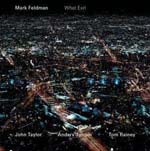
Anyway, these records were important to me and I think, in my mind, I always wanted to make a piano-bass-and-drums record, what I considered kind of a jazz record with a rhythm section. I think I wanted to make one without another horn because for twenty years now, I've been pretty active as a sideman and have always been playing in groups with other horns.
And I think my music has a certain sensibility, so that when I thought about bass players, drummers and pianists, these were the people that came to mind. Tom Rainey came to mind because he can play anything, and I'd worked with him quite a bit. He's got a huge jazz background, but also a contemporary improv background, and he's a great reader. I needed people who could play out of the modern mainstream and contemporary jazz tradition, but that were also great readers; they had to be able to read well. And I felt I had a sympathetic feeling for these people from listening to their music. That's not so specific, I know. I guess they were just players that I loved and I always wanted to make a record with this instrumentation. That's more succinct!
I mean, basically, they were all players that I really liked. And there are a lot of players that I like, of course. But then you have a certain kind of music that requires a certain combination of skills. In this case, it did. And that starts to narrow it down. You might say, "Oh, I love this bassist, but the last time I was on a gig with him, he had to play arco in thumb position and I still loved him, but I didn't love that moment. And I've got a lot of arco in thumb position, so that whittles that list down. And so on. And then when it came to that point of whittling the list down, I had it pretty much down to these people. Luckily, everyone I asked said yes, so I got my first choices.
AAJ: I'm curious as to just how specific a notion you had of what sort of record you wanted to make. Obviously, you had the compositions, but did you know, for example, just how much improvisation you wanted as opposed to composed material?
MF: Well, I thought the pieces that I wrote had a specific requirement. I didn't have any kind of formula, no. I definitely wanted to make what I consider a jazz record, and that means there's quite a bit of improvisation—maybe less than some other jazz records, of course. I wasn't really thinking of any formulas. I really wanted to just write my own music and have a free reign, you know—make my own statement after all these years of being a sideman. This would be how I would present this kind of instrumentation and this kind of world; this is my idea.
So if you look at a piece like "Father Demo Square, for instance, that's a real head-solos-head piece. Totally. Then there's other pieces that are definitely not that, but from my perspective, you couldn't really make an arrangement for them for mixed ensemble or string quartet. They were really specific kinds of ideas for a rhythm section with a violin.
AAJ: I've listened to this album quite a few times in the last several weeks.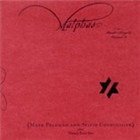 MF: Well, that's a compliment right there. It really is, because there's such a glut—I wonder how anyone has any time to listen to anything. And if anyone even tells me they listened to the whole thing, I'm happy.
MF: Well, that's a compliment right there. It really is, because there's such a glut—I wonder how anyone has any time to listen to anything. And if anyone even tells me they listened to the whole thing, I'm happy.
AAJ: When I listen to it, I'm struck every time by the remarkable amount of dynamics in the music. It's striking; it goes from whispers to real vehemence. I'm also struck by the spaciousness of the music—the importance of silence as an actual component of the music. That's something the other players really seem to grasp: that not playing is at times as important as playing. At times, the players are as noticeable in their absence as their presence. Any insights into this?
MF: I would say that's pretty much on the money, because from what I remember of the rehearsal time that we had, that was an exact phrase that I would express to the others, especially on certain pieces. The choice of not playing. I tried to construct the pieces in a way that the choice of not playing was just as visceral or important to the player as playing—not just as a place to rest your chops. And as far as dynamics go, I would say that in my own development in the past five, six, seven years, developing a larger dynamic range has been something I've been really conscious of.
Part of it was when I stopped playing electric violin and starting performing only through a microphone. And when I started performing on a much more concert-quality violin, I was able to develop a much larger dynamic range than when I was plugging into a guitar amp, so to speak. That became more and more important to me, and some of the elements I wanted to add to some of these models that I had lurking in the back of my mind like Sunday Walk and Man of the Light were a larger dynamic range and a greater use of space.
AAJ: Those are characteristics that can be unnerving to casual listeners. I don't think people are as accustomed to those qualities as they once were.
MF: Right. Other people have used this phrase: "casual listener. It's a new one for me, and I think it's interesting. What this means, maybe, is people who put the record on when they drive? Or people who put the record on and do other things?
AAJ: Well, what it really is is a cliché, so I'm embarrassed to have used it.
MF: Well, I don't mean to be overly pedantic. I know that if I'm doing a little workshop with someone, some students, and I want to touch on this concept, I'll stop talking and use a lot of silence in my speech. When you start putting silence in your speech, it really does either make the other person pay more attention—or be really uncomfortable. Any time you break the pattern of what people are used to, what people expect, it can make them uncomfortable. Or it can bring more attention to certain elements. When you look at music like Morton Feldman's, that would be an extreme example of using silence and spaciousness, wouldn't it? And it's certainly successful. It certainly isn't for casual listening, I guess. Of course, it certainly isn't jazz, either.
AAJ: Well, on this record, I think the dynamics and silences make the music more effective. It's just part of what the music is.
MF: Well, I'm glad you see it that way. I think so, too. I just think the more multidimensional you can make your music—for me as a listener, the more I'm interested. I mean, there's certain music I really like. And there's a lot of pop music I like, but I notice that I don't like it for a long time. I tend to like one or two tunes. Because if I listen to more than one I start to get numbed-out by the lack of different elements.
Anyway, in my music, some of the elements that I find important would be a big dynamic range and a good contrast of silence to activity, fact activity to slower activity, more harmonic movement to less—all these things keep me interested as a listener, as long as it hangs together as one vision. You could do all those things and it could just be a hodgepodge, and then it wouldn't be successful.
You know, at this early stage, one thing that I've read that people have written about my music is that it's a combination of genres. And I don't really feel this is true. I really don't feel like I'm taking different genres and pastiche-ing them in a kind of postmodern way, or something like that. But of course, everyone has an opinion. AAJ: Well, sometimes people say that something is a mixture of genres when they're having trouble saying just what genre something is—which is to say it might be its own thing.
AAJ: Well, sometimes people say that something is a mixture of genres when they're having trouble saying just what genre something is—which is to say it might be its own thing.
MF: Right. This doesn't really fit. I really felt like I was trying to make a jazz record. But that doesn't mean that I was going to break out all my old Blue Notes, or do that old stereotype where you say, "Okay, we're going to do a jazz record, so let's see—we need a blues, we need a rhythm tune, we need a bossa, we need a waltz, we need a flag-waver. You know what I mean? Then you've got a jazz record. And that's the way that people sometimes make their set lists. "Oh, now we should do something in three. We didn't do the three tune yet.
So when I said I was going to do a jazz record, it didn't mean that. There is something that has kind of disappointed me. I'm 51 years old, so you can tell the years when I was quote-unquote coming up. It was right after the death of Coltrane. And I was born at the death of Charlie Parker. So when I was coming up, there was this really big judgmental aesthetic that you had to have your own sound and your own conception. You really had to be as original as possible; that was what made others look at you and say that it was valid. Now I feel like I have made my own music and my own sound and my own aesthetic to a certain extent—maybe that's why I waited so long. But now some people are going, "What is this? Why are you doing that?
AAJ: [laughing] I'm sorry to laugh.
MF: Well, it's kind of funny. But it's what's happened. "What the hell is that? This isn't jazz. And well, yeah—because we didn't put the flag-waver and the rhythm tune in! So maybe what happened is that through the 35 years that I was working, the aesthetic—well, maybe the expectation—kind of changed. I'm not sure. Also, I think that maybe people are uncomfortable with the classical European flavor of my sound. But I feel that this is my sound. This is what I've found. I used to be a fiddle player who played through a guitar amp. I used to try to copy saxophone licks. I used to use no vibrato. I used to do that kind of jazz-violin thing. But you know, I am of European descent. I am a violinist. I think the legacy of the violin is part of my picture. I shouldn't try to push that into a corner, or something.
AAJ: Well, I think the best thing about What Exit is that it's the only record I own that sounds like What Exit. And you've been playing with that European tone for years now, so if you went out and made a boogie-woogie fiddle record, it would be peculiar.
MF: Yes, it would be peculiar. It would be peculiar even if I had done a few jazz standards. I think it would be weird unless I was saying that I was totally changing my thing. I just feel like I've worked a long time to make my own kind of individual approach with all these kinds of critical aesthetic viewpoints that I was brought up with all these years—that you should be able to play and have people be able to tell who you are in four notes, and that your music shouldn't sound like anybody else's. This was what I got fed for thirty years until it grew on me that those were important issues.
AAJ: Let me ask you about some of the pieces on the record. I was initially obsessed with "Arcade, the first song on the record. It's a long one. I wasted a lot of time trying to break it down into sections and I can say that its vast interior is book-ended by what I'll call its "A section, a head of sorts, where Tom's cymbal rhythm is joined by Anders' solo bass statement, John's somber sparse piano chords and your violin sort of cutting across the rhythm. This section feels like a sort of gate that surrounds the mysterious and spacious territory of the song's interior, which seems deeply improvised except for certain linking violin or unison violin/piano phrases. This doesn't do anything to describe this piece, so tell me about it. MF: Well, I would say that basically, what I was trying to do was have these bookends, like you say, and in the middle I was trying to create an incredible group improvisation. That's what I was trying to achieve. In my fantasy it would be like if a group on a certain night, kind of a one-time event, was so connected, and was playing totally free. This would be the result, or a possible result. So of course, it's really obvious what I did when I used these unison figures. In one section, what I did was that the violin and the drums have one score, or parts, and the piano and the bass have a different part. And all the parts have a certain number of bar segments, and sometimes within those segments, there's a bar with a fermata that says "improvise, and sometimes one of the segments is actually "improvise. And each one of these two duos has a leader and they can call the order of these events, or these eight-bar written sections; they can call it in any order they want, including not doing anything. Total silence.
MF: Well, I would say that basically, what I was trying to do was have these bookends, like you say, and in the middle I was trying to create an incredible group improvisation. That's what I was trying to achieve. In my fantasy it would be like if a group on a certain night, kind of a one-time event, was so connected, and was playing totally free. This would be the result, or a possible result. So of course, it's really obvious what I did when I used these unison figures. In one section, what I did was that the violin and the drums have one score, or parts, and the piano and the bass have a different part. And all the parts have a certain number of bar segments, and sometimes within those segments, there's a bar with a fermata that says "improvise, and sometimes one of the segments is actually "improvise. And each one of these two duos has a leader and they can call the order of these events, or these eight-bar written sections; they can call it in any order they want, including not doing anything. Total silence.
And this is kind of a technique that people like [composer Pierre] Boulez have used. [composer Witold] Lutoslawski used it to a certain extent. But there are some Boulez works—I have a video where he's rehearsing a piece where basically, the conductor makes all the decisions. Or the conductor makes some of the big decisions and the players make these little micro-decisions. So this is not such a new idea—but maybe to insert it in this piece and to have it done with this instrumentation where people are still somewhat using a jazz vocabulary when they do improvise is kind of new. New-ish.
AAJ: Was this the only recorded version that you did of this piece? Or did you try it a few times?
MF: I did two takes. So the two things that are going on are unison passages with things going on after that are usually free, but the instrumentation, or the function of the different people, is predetermined. Like there's one where the bass is the soloist and others are droning—simple stuff. Then there's this other modular approach that I just mentioned to you. So if I have a chance to tour for any extended period, I thought it would be great to write new modules, so to speak, new events, and tape them into the players' music without the other team knowing it. Because you're supposed to listen to the other and react—make your decision about which number you're going to call next.
It didn't really come to me in a direct way, but I don't think I would have had these ideas if I wasn't familiar with contemporary classical music. But it also came from being familiar with working with [John] Zorn—just having the concept that someone might make a decision that controls another person to make a certain kind of musical gesture is something that I experienced in [Zorn's group] Cobra.
AAJ: Well, what you were saying just a minute ago certainly made me think of him.
MF: Right. But as soon as you were to write that on paper, people would have a whole impression about the quality of the music—which would be wrong. Not to say that you should write it or not. John's music is very, very strong and sounds a certain way. But you can use some of these ideas and get incredibly different results.
AAJ: You almost describe "Arcade as a sort of experiment that you were curious to try, to put into action. Were you surprised by the results?
MF: No, and in fact I don't consider it an experiment. I could hear it—at least conceptually—so strongly that I was sure it was going to work. As long as people left enough space, I was sure it was going to work. As long as people were really kind of in the moment and making their decisions based upon what they were hearing.
AAJ: Coming after something as vast and austere as "Arcade, "Father Demo Square seems like familiar old swinging jazz—which is certainly is not. It does swing, and it's got heads, but it's knottier than that with its mixed meter and stop-time quality. It is wonderful, however. I particularly like John's—well, I'm going to call it comping—over Anders' bass solo.
MF: Oh, it's totally comping.
AAJ: It's very un-clichéd comping, though.
MF: Yeah, he's incredible. His whole playing is so recognizable and un-clichéd—but at the same time, it's so clear and he fulfills all the functions that need to be fulfilled without sounding like somebody else.
AAJ: I can't think of another pianist who could play around your violin as impeccably as he does on this recording.
MF: He was totally on that level that he was at, and at the same time, totally concerned about which register he should be in, in order for the violin to speak, all that kind of stuff that made it work. He's just such a great musician, and I think he's trying to always make it work. Not just have a preprogrammed agenda that, "This is my way, and this is my shit. Because rhythmically, too, he is such a master of subdivisions. That's what I feel. Also, he's a master of playing with the other—if he wasn't so musical, he could comp in a way that was much more interesting than any of my solos. You would be listening to the comping. But he never went there.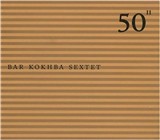 AAJ: To me, there's something profoundly unsettling and inconclusive about "Elegy. It seems so simple in its structure—a sort of alternating of your long chordal violin sighs with these rumbling drum, piano and bass statements. But it's fascinating. What can you tell me about this piece?
AAJ: To me, there's something profoundly unsettling and inconclusive about "Elegy. It seems so simple in its structure—a sort of alternating of your long chordal violin sighs with these rumbling drum, piano and bass statements. But it's fascinating. What can you tell me about this piece?
MF: Well, I first recorded it on one of the only other records I've done as a leader. I did it eleven years ago or so, and it was called Music for Violin Alone [Tzadik, 1995]. A solo, unaccompanied violin record. So I wrote it a long time ago. My model in my mind was kind of the chorale from the "Histoire du Soldat —the "Soldier's Tale by Stravinsky. It's not that I even looked at the music; I just thought about that piece and how great it was, and then wrote my own piece [laughing]. That's my idea of a model.
I think also, in wanting to make my own kind of statement, I went so far as to say, "I'm going to have a song on my own record where I don't even solo, because musically, it's going to be better. I just wanted to really go there, because normally the question is whether or not you're going to take the first solo—if we go back to the stereotypical things we were talking about before. Normally, the biggest decision is, "Should I solo first or not? And then I wrote this piece, and I realized that it would really be the most effective if I pitted the violin against the rhythm section. So whatever I'm playing—these kinds of church or chorale things, these hyper-Romantic kinds of big, blocky statements—let the rhythm section respond. I thought it was really nice to have a piece where there wasn't a violin solo.
AAJ: Tell me about "Ink Pin. I guess it would be rude of me to call it a sort of a Frankenstein monster of musical fragments, since it's certainly more than that.
MF: That's my little postmodern, funny little vibe. When I first wrote the piece, I thought we'd play the head first and then everyone would play a solo over a time-no-changes, free-bop kind of vibe—one after another. And then it really sounded like an Ornette tune to me. I would say that my major inspiration here would be somewhere between Ornette Coleman or even John Zorn. But not in any kind of quoting way. But I thought that the opening theme was kind of Ornette-ish, but nobody else really seems to think so [laughing]. Someone else wrote that it sounded like Aaron Copland's "Hoe-Down. Which was disconcerting to me. You know that piece?
AAJ: It does not sound like "Hoe-Down.
MF: But anyway, I thought it was just a little fanfare thing, then a little swing thing in the middle—to me it's not so serious that you could call it "Frankenstein. To me, it's supposed to be a little humorous.
AAJ: Maybe more Frankenberry than Frankenstein.
MF: [Laughing] Frankenberry. No, there's kind of a Downtown-sensibility events thing, then that Ornette thing, and then when I play that swing melody—the way that I stamp my foot three times was like some of those earlier swing guys or bebop guys. You never heard them count out loud; they always counted tunes off that way, by stamping. So that's a little part of the joke.
AAJ: Well, it's a very playful piece.
MF: Yeah! It's supposed to just be funny, but played seriously. That's just my little vibe. It's not really supposed to be "genre-bending or anything like that. AAJ: Well, the band plays the hell out of it.
AAJ: Well, the band plays the hell out of it.
MF: They play great. There are a couple of jokes in the record. That to me is a joke, and the tune "Maria Nuñez has a little kind of code. That's the other tune that's really more of a straight-ahead jazz tune in the sense that it has a head, chord changes in an exact form, and then head again. But "Maria Nuñez was a story from the 1400s about the first female head of family to go from Portugal at the time of the Spanish Inquisition to Amsterdam. There was this whole mythology about her—that she was so beautiful that this British captain tried to get her to move to England, all of this stuff that people don't even know is really true or not.
So in the middle of that piece, before the second section, I put this little quotation from [Rimsky-Korsakov's] "Scheherazade, just to try to give the signal that it's a mythic story. But I don't know if anyone's going to get it [laughing]. That's the deal with that one. And to me, that's kind of funny—it's humorous. Not like a pun, or something, but just a little cleverness that operates on more than one level.
AAJ: Well, they do call it "playing music. Anyway, that is, as you note, one of the jazzier tunes. It's got a very memorable melody, and almost feels like a tango to me.
MF: Well, it's supposed to be about that Spanish woman, so I had something more Spanish in mind. But it's kind of close from our perspective here in New York.
AAJ: Is this a working group? Have you performed this music live?
MF: I performed it once in Italy before the recording. I performed it once in New Orleans, but with some replacements in the band.
AAJ: With [bassist] Drew Gress, I think?
MF: Drew Gress and Neil Kirkwood on piano. And I hope to perform it next year on a tour of Europe that I'm trying to put together. I've got an agency trying to help me, and I hope I can do that.
AAJ: Do you think this is the beginning of a recording relationship with ECM?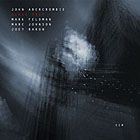 MF: Well, yes. I mean, I think my recording relationship with ECM started when I started playing with [guitarist] John Abercrombie. [ECM label head/producer] Manfred [Eicher] had spoken to me about doing a record, and it took me about a year—quite a while after he first mentioned it, anyway—before I actually could say what I wanted to do. I'm not so fast. So I think the answer is yes, this is the beginning of a relationship, but I don't think you're going to see a record a year. Which is unfortunate, because it seems like that's really the way that things are done now.
MF: Well, yes. I mean, I think my recording relationship with ECM started when I started playing with [guitarist] John Abercrombie. [ECM label head/producer] Manfred [Eicher] had spoken to me about doing a record, and it took me about a year—quite a while after he first mentioned it, anyway—before I actually could say what I wanted to do. I'm not so fast. So I think the answer is yes, this is the beginning of a relationship, but I don't think you're going to see a record a year. Which is unfortunate, because it seems like that's really the way that things are done now.
Nowadays, the field is so crowded and everything's so difficult; to have anyone's attention, it really helps if you put out a record every year. If you do that—well, look at some of these people: they have twelve records out. But you don't want to put out one record twelve times. So it depends on how fast you can have something really new to say. Or, you know, if you really just wanted to get away from business and there was something you really just wanted to say, that you felt you had to say, that you should say. Instead of, "Well, in order to maintain my profile in the music industry, I should— Which is where a lot of things are at these days!
AAJ: Yeah, that definitely should not be a reason for getting some new music together.
MF: Yes, but I'm sure that it is a lot of the time. Anyway, I don't think I'll be doing a record every year. But unless something changes, I think I'll do another one, yes.
AAJ: I do want to ask you some questions about your side work. You are a current member of John Abercrombie's quartet with bassist Marc Johnson and drummer Joey Baron. You first recorded with him on the Open Land CD (ECM, 1999) but the first with this particular quartet was Cat 'n' Mouse (ECM, 2002).
MF: Yeah, and then we did Class Trip (ECM, 2004) and we just did another one about six months ago. I don't know the name of it—I don't know if it's been named. But it's been recorded. Hopefully, it'll be out in March [April, actually], and I think it's the best one.
AAJ: I love the first two records by the group. I very much like this band, and so do a lot of other people. I think the chemistry is special. Tell me what you like about playing with this group.
MF: Well, they're just all on such a high level musically. And John, well—first of all, personally, he's the greatest leader in the world because he's just such a nice guy, and really wants everybody to feel good about their playing. He gives you a lot of freedom. At the same time, the people in the group are mature enough that they really try to serve his music. I think basically, what I like about it the most is just the level—the musical level. The players are so good. I never thought I would be playing with people like that, so it's really a thrill. And I've come to John with a lot of questions about this music, and harmony, and it's been great. He's really helped me.
AAJ: Is there anything particularly different about this new record you've recorded with the band? Anything radically altered from the approach taken on the last two CDs?
MF: Not radically, no. I just think that maybe it's more mature. But you know what? I didn't hear anything but the playbacks, so I don't know. But I don't tend to be an overly positive person, so I don't think I'm just rooting for it. I just remember feeling that it reflected that the group's been together that much longer.
AAJ: You have a pretty fruitful musical relationship with pianist Sylvie Courvoisier.
MF: Right, who's also my wife.
AAJ: Yes. You've played with her in Masada Recital.
MF: Yeah, and on Malphas, Book of Angels [Volume 3: Mark Feldman and Sylvie Courvoisier Play Masada Book Two (Tzadik, 2006)]. And also on her record.
AAJ: Right, with cellist Erik Friedlander, on the album Abaton (ECM, 2003), which is also the name of the group. She's a great composer and a very fine player. You play with her often; you just did a pretty long European tour with her in the spring and a show at Merkin Hall in New York very recently. Tell me about working with her, both in the duo configuration and in the trio with Erik.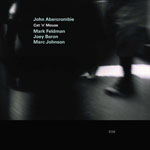 MF: Well, she also just recorded another album that's going to be released in January, I think, for Intakt Records. It's called Lonelyville, and it's her music; she's the leader of the group. It's her, myself, this French cellist named Vincent Courtois—he'd be most identified as being part of the [reeds player/composer] Louis Sclavis circle in France—[drummer] Gerald Cleaver and [electronics artist] Ikue Mori. This record is great. I just heard the mix, and I think it's some of her best work.
MF: Well, she also just recorded another album that's going to be released in January, I think, for Intakt Records. It's called Lonelyville, and it's her music; she's the leader of the group. It's her, myself, this French cellist named Vincent Courtois—he'd be most identified as being part of the [reeds player/composer] Louis Sclavis circle in France—[drummer] Gerald Cleaver and [electronics artist] Ikue Mori. This record is great. I just heard the mix, and I think it's some of her best work.
This is another project of hers that I think is great. We worked really, really tightly on the duo stuff. And, I think all her stuff, all the projects you've mentioned—it all gets laid out on the breakfast table. We really work closely. We work together a lot, and I think we say things together that we wouldn't say to someone we were working with normally. I think that can go either way, but in this case it's really brought some good results. When I improvise with her, it's definitely different than with anyone else. I think it's connected more immediately. We're at the point now where we can almost turn it on and off like a faucet. We can just start playing and it seems like it's always happening. We sort of developed a vocabulary between us.
AAJ: I think that's rather cool. Lots of us have fine relationships with our spouses, but we don't work with them. When the two of you did that European tour, what material were you doing? Was it all improvised, or what?
MF: No, on the last tour we did, we did all the Malphas record—the Zorn material. We have some old material, and we're trying to write new material. But this is really the struggle for me—to write new stuff. So we're trying to write something new, and then do a new CD of our own material. So we're trying to decide which direction it should go in; it's really hard for me until one or two pieces are written and we kind of decide, "That's it. Then it floods in, but before then, it's kind of like, "Jesus, how did I ever write a piece in my life? How did I ever do this?
Same thing with playing. When I'm home, a lot of the time I'm just practicing scales, bowing in the mirror and all that kind of stuff. Then I listen to some record I made and I think, "I don't even know how to play that! I get so bogged down in details of playing or what I should be doing. Then when I hear that I actually did it, I'm really surprised.
AAJ: You certainly don't sound like any sort of egomaniac to me, that's for sure.
MF: Well, I think it's good when I hear it, but I am surprised. But I wonder how the hell I did it; it almost seems like someone else. Then, when you go out and play, you have to forget about all this technical stuff.
Tags
PREVIOUS / NEXT
Support All About Jazz
 All About Jazz has been a pillar of jazz since 1995, championing it as an art form and, more importantly, supporting the musicians who make it. Our enduring commitment has made "AAJ" one of the most culturally important websites of its kind, read by hundreds of thousands of fans, musicians and industry figures every month.
All About Jazz has been a pillar of jazz since 1995, championing it as an art form and, more importantly, supporting the musicians who make it. Our enduring commitment has made "AAJ" one of the most culturally important websites of its kind, read by hundreds of thousands of fans, musicians and industry figures every month.










